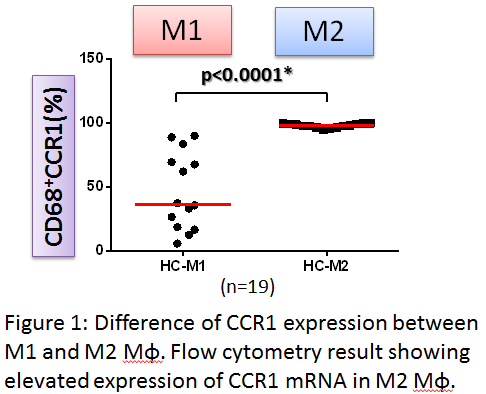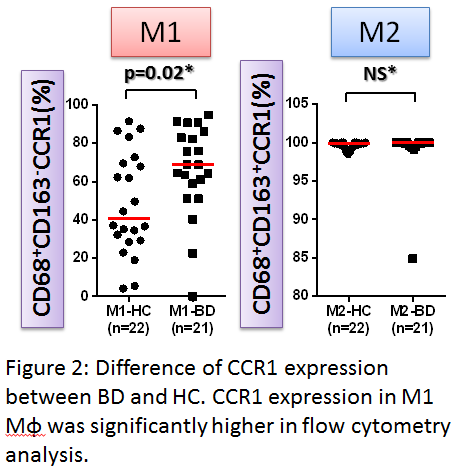Session Information
Date: Tuesday, November 15, 2016
Title: Cytokines, Mediators, Cell-Cell Adhesion, Cell Trafficking and Angiogenesis - Poster II
Session Type: ACR Poster Session C
Session Time: 9:00AM-11:00AM
Background/Purpose:
The recent GWAS and subsequent studies have identified susceptible genes such as CCR1 and IL10 genes, suggesting pathological roles of macrophages in Behçet’s disease (BD). The purpose of this study is to compare features of in vitro differentiated M1 and M2 macrophages from peripheral blood between BD and healthy controls (HC).
Methods:
Differentiations into M1 or M2 macrophages were induced in vitro from peripheral monocytes in presence of GM-CSF or M-CSF, respectively. Expressions of CD68, CD163, and CCR1 were determined by realtime PCR and flow cytometric analyses. For the macrophages that were treated with LPS for 24 hours, the supernatants were analyzed for cytokine profiles using beads assay.
Results:
Differentiated M1 macrophage produced higher amounts of IL-6 whereas, M2 macrophage secreted higher volume of IL-10. M2 macrophage has increased expression of CD163 protein and mRNA compared to M1 macrophage. CCR1 expression was increased in M2 macrophage compared to M1 macrophage (Figure 1). Cell surface CCR1 protein expression in M1 macrophage was significantly higher in BD patients compared to HC (Figure 2, t test). BD associated SNP (rs1518111) allele T is risk for decreased expression of IL10 mRNA in HC M2 macrophage.
Conclusion:
The data suggest that both susceptible CCR1 and IL10 genes are implicated in pathogenesis of BD. Further experiments including functional analyses are required to elucidate mechanisms how M1 or M2 macrophages are involved in pathogenesis of BD.
To cite this abstract in AMA style:
Nakano H, Kirino Y, Ohno M, Higashitani K, Takeno M, Yoshimi R, Nakajima H. Functional Analysis of Macrophages in BehçEt’s Disease: C-C Chemokine Receptor Type 1 (CCR1) and IL-10 Are Implicated in Pathogenesis of the Disease [abstract]. Arthritis Rheumatol. 2016; 68 (suppl 10). https://acrabstracts.org/abstract/functional-analysis-of-macrophages-in-behcets-disease-c-c-chemokine-receptor-type-1-ccr1-and-il-10-are-implicated-in-pathogenesis-of-the-disease/. Accessed .« Back to 2016 ACR/ARHP Annual Meeting
ACR Meeting Abstracts - https://acrabstracts.org/abstract/functional-analysis-of-macrophages-in-behcets-disease-c-c-chemokine-receptor-type-1-ccr1-and-il-10-are-implicated-in-pathogenesis-of-the-disease/


